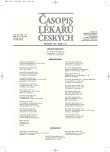-
Medical journals
- Career
Capsule Endoscopy – The Past, Presence, and Future
Authors: P. Drastich
Authors‘ workplace: Klinika hepatogastroenterologie IKEM, Praha
Published in: Čas. Lék. čes. 2006; 145: 432-436
Category: Review Article
Overview
Wireless capsule endoscopy is a safe non-invasive method for the examination of the small intestine and terminal oesophagus. Examination is well tolerated by most of the patients. Due to the possibility to assess mucosa of the small intestine in details, capsule endoscopy has the diagnostical yield higher than other available methods. It is effective namely for study of obscure bleeding, celiac disease and Crohn’s disease. Capsule endoscopy is aimed at the longterm follow up of patients with Barrett’s oesophagus, however, the costs are higher than using gastroscopy. Capsule retention represents the most serious and practically the only complication of the examination which frequently requires surgical treatment. The future of capsule endoscopy depends on the next development of the technology.
Key words:
capsule endoscopy, bleeding into the gastrointestinal system, Crohn’s disease, celiac disease, small intestine examination, Barrett’s oesophagus.
Labels
Addictology Allergology and clinical immunology Angiology Audiology Clinical biochemistry Dermatology & STDs Paediatric gastroenterology Paediatric surgery Paediatric cardiology Paediatric neurology Paediatric ENT Paediatric psychiatry Paediatric rheumatology Diabetology Pharmacy Vascular surgery Pain management Dental Hygienist
Article was published inJournal of Czech Physicians

-
All articles in this issue
- Meckel’s Diverticulum
- Capsule Endoscopy – The Past, Presence, and Future
- Prediction and Monitoring of Severe Acute Pancreatitis
- Fatty Liver Disease and Statins – Which Discipline the Problem Belongs To?
- Hyperamylasemia, Laboratory and Clinical Aspects
- Different Views on the Association between Cannabinoids and Cancer
- Injury of the Scapholunate Interosseal Ligament – Scapholunate Dissociation
- Changes in Serum and Adipose Tissue Fatty Acid Composition after Low Calorie Diet with Respect to Dietary Fat Content in Obese
- Changing Clinical Image of Celiac Sprue in Childhood
- Hereditary Forms of Colorectal Adenomatous Polyposis
- Faecal Elastase I. Assessment – Its Use in Diagnosis of Chronic Pancreatitis
- Evaluation of DHPLC Analysis for Mutation Detection in Haemophilia A
- Paraneoplastic Encephalitis
- Patient’s Human Dignity and the Health Care
- Risk of Alcohol Abuse in Adolescence
- Journal of Czech Physicians
- Journal archive
- Current issue
- Online only
- About the journal
Most read in this issue- Faecal Elastase I. Assessment – Its Use in Diagnosis of Chronic Pancreatitis
- Injury of the Scapholunate Interosseal Ligament – Scapholunate Dissociation
- Hyperamylasemia, Laboratory and Clinical Aspects
- Capsule Endoscopy – The Past, Presence, and Future
Login#ADS_BOTTOM_SCRIPTS#Forgotten passwordEnter the email address that you registered with. We will send you instructions on how to set a new password.
- Career

